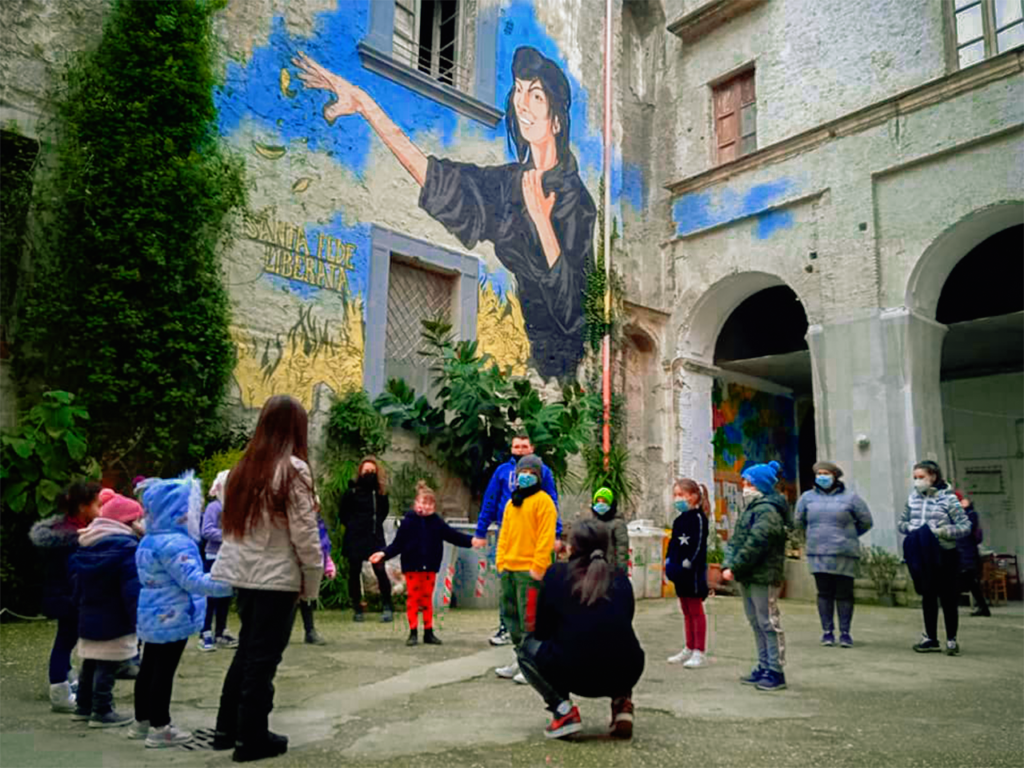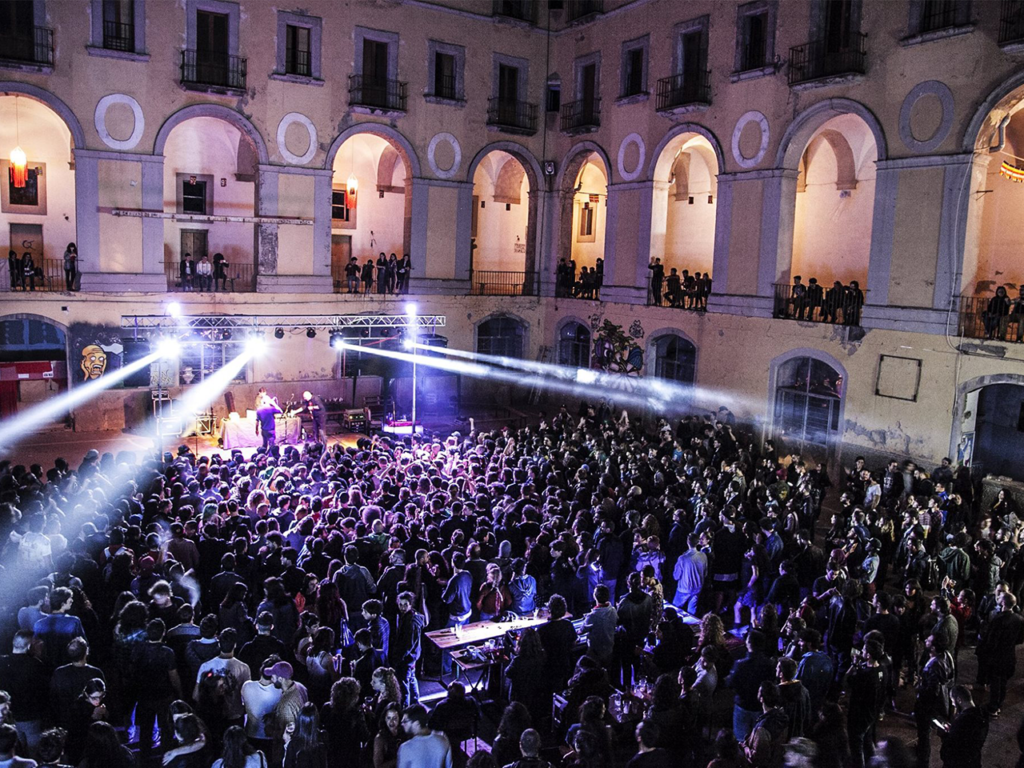The activities that take place in the Neapolitan commons are very varied and depend on the proposals put forward by those who traverse the community or participate in the assembly, each one acting as spokesperson and bearer according to the values that moves them and initiatives they feel the urgency to spread. The entire community of the commons will provide, according to its strengths, energies and availability of space and means, to welcome the initiatives, offer logistical support based on its experience, and communicate them to the best of its ability. By their very vocation, the commons in Naples strive to be receptacles and containers for bottom-up initiatives. As centres of alternativity and alterative culture, interdependent and not dependent, the commons do not follow a specific political line, nor is there an artistic direction to which the proposed activities must align or be subjected, like a selective filter. The commons are born precisely in opposition to this type of hierarchical and pyramidal logic, unhinging roles and presumed authorities that stand as diffusers of first and second class culture, popular culture, kulture or subculture. Thanks to the spirit of welcome that animates communities that are always free and always different, depending on who is passing through them at the time. So for the commons, the cultural plurality and alterity of values, content and art is guaranteed, preserving its biodiversity.

Bottom-up politics, self-education and self-awareness
In a commons, in addition to artistic and cultural initiatives, meetings of a political rather than party-oriented nature are held and self-organised, in which the public’s attention is focused on sensitive issues that are little addressed, either because they are geographically distant or because they are contrary to the logic of the market and big interests, in an attempt to dictate the political agenda from the grassroots level and steer public opinion onto paths less travelled. In this sense, the Neapolitan commons host various popular initiative committees, welcoming them into their spaces, trying, as far as possible, to encourage active and responsible citizenship, the feeling of political solidarity and cooperation between peoples, as well as hosting individual events or discussion tables open to the public on a given issue. Each Neapolitan commons has its own particular vocation and declines its civil and political commitment in a different way depending on the members of the community who animate it and the values of which they are bearers. In a commons, therefore, all types of activities are possible (after-school programs, teaching Italian to foreign citizens, psychological support, free medical care, counseling services, popular gyms, self-awareness tables) that do not go against respect for the individual. In addition, there are also laboratories and workshops that allow those who do not have the possibility of having a private space to disseminate their art, know-how and artistic experimentation practices to those who wish to do so, at popular, non-market prices. Spaces often also host artistic residencies or serve as rehearsal rooms, coworking or study rooms for workers in the immaterial, cognitive, artistic and performing arts that manage to emerge with difficulty and do not find the necessary support to conduct their research and experimentation. In this sense, commons also welcomes private, or restricted, initiatives, but not in a private way insofar as openness to the public is always safeguarded thanks to transparent communication and the attention paid to reconciling legitimate private interests with the highest interest, which is that of everyone: the common interest that commons are always and in any case called upon to pursue as a priority.
Public events
The initiatives that the commons can host can range, therefore, from cineforums or film festivals to give particular visibility to small productions, local productions or works that are little valued by large-scale distribution, which is regulated by market interests and therefore does not aim to guarantee free access even to minority or marginal cultures (which are often more artistically experimental and politically outspoken). They can be live concerts, perhaps of emerging bands or bands conducting experiments that the standardised market cannot understand. They can be festivals for conveying another kind of culture (musical, traditional, culinary, artistic, comic), in a joyful way, giving value to identities that would otherwise remain submerged and promoting encounters between otherness and alternative cultural models, through interchange and, in this way, enlarging one’s own community to include others (it is in this way that the openness of the community and its porous, welcoming and horizontal nature is guaranteed). These festivals, however, never respond to competitive but cooperative logics, distinguishing themselves, in this sense, from market logics which, on the contrary, always foresee a winner and a loser, a high and a low culture, individual merit and talent recognised at the expense of others and of the collective genius, creating divisions and segmentations that fragment rather than create a (not amalgamated or homologated but) enlarged community.

Free, not “for free”: economy yes, but of the gift economy
Public events are never subject to tickets and are always freely accessible, with the intention of spreading culture: at most, a free and voluntary contribution is requested to remunerate the work of the artists, and to support the living expenses that allow the volunteers and those who inhabit, populate, cross and animate the commons to make the most of everyone’s commitment. No activity, no proposal accepted in the assembly, no initiative (laboratories, seminars, workshops, concerts, screenings, performances, conferences, study groups or work groups), for no reason, can require participants to make a binding and, therefore, potentially exclusionary economic contribution that limits the community’s crossing of a commons. These communities, during the promotion of public events, seminars or workshops, accepted and scheduled after the passage in the assembly, can ask for a free and non-binding subscription, aimed at contributing to the collection of funds to support themselves, to meet small living expenses, to equip themselves with means of production that will then be offered to the free use of the public or to self-recover parts of the commons to be returned to a more accessible use.
Self-organised thematic tables
In the commons, the use of a space is never exclusive to anyone (neither to the community that cares for it most assiduously nor to those who historically liberated it in the first place) but always collective, transcending that private approach to a good which assigns its use to someone at the price of excluding someone else. In order to do this, the management of a common good goes beyond private or public forms, but is always a self-management by the entire community, through the assembly, which schedules the use of the spaces, temporarily entrusting them to those who request their use, guaranteeing the rotation and continuous turnover that preserves the most widespread inclusion possible. In this sense, use is planned (together, there are no formal or informal management or hierarchies) to allow free, (self-)organised and guaranteed access for all, never private or exclusive. The commons can establish other and further moments of confrontation, in addition to the assemblies, always characterised by a communication that is transparent and guarantees the widest possible use by all inhabitants. The commons are free to self-organise, specifically by convening tables or focus groups that function as sub-assemblies, whose purpose is not to burden the assembly with decisions regarding merely organisational and logistical matters, divided by affinity or interest groups or regarding a particular space. In no way should this organisation, which seeks to make time more efficient, deprive of meaning the widespread and participatory decision-making moment that is, and remains, that of the assembly, where it is possible for the whole community, potentially infinite, to meet periodically and cultivate the relationship and the pleasure of meeting others.